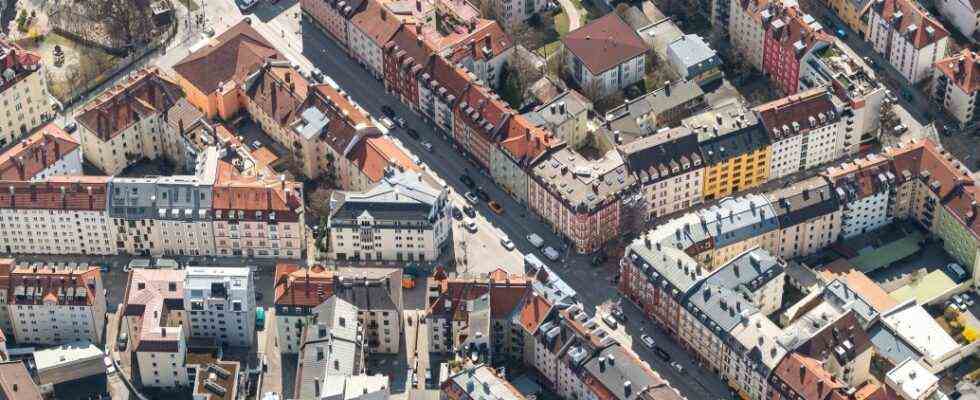There will be no revolution in the real estate market. But a few social exclamation marks could come out of it. With a foundation, some real estate players want to create more space for affordable and safe living and at the same time a counterpoint to the pursuit of maximum profit with rental apartments. Socially minded homeowners who want to part with their property should find it easier to sell their property in such a way that not only they but also their tenants benefit. A new, non-profit foundation called “Daheim im Viertel” wants to make this possible.
Christian Stupka, thought leader for socially responsible planning, building and living and board member of the cooperative real estate agency Gima, publicly presented the idea behind the foundation on Friday. The foundation, recently recognized by the government of Upper Bavaria, wants to promote life in the Munich neighborhoods: support good neighborhoods and living environments through existing and new initiatives, be it in matters of integration, inclusion or ecological mobility.
“What a strengthening feeling: To know that you are really at home in your own neighborhood”: This is how the foundation’s preamble begins. “The apartment is safe and affordable.” For many Munich residents, however, the second sentence is not a fact, but at most a wish and hope. Many fear that they will be evicted from their traditional neighborhood, be it due to rent increases, notice of termination, expensive renovation – or because the owners are selling. This is where Stupka’s foundation concept comes in: “Without safe living everything is nothing,” he says. “That is why real estate has to be brought to a safe haven.”
The basis of the concept is the experience that socially minded landlords are not as rare as one might think given the rent level. If they part with their house, for reasons of age, for example, it has so far been made difficult for them to protect their tenants from excessive price increases. The reason is the large gap between socially acceptable rents – in Munich, 11.50 euros per square meter are still okay – and the market prices, which are often around 20 euros. These market prices determine the market value of a house. Assuming this is ten million euros: If an owner wants to guarantee social rents on a permanent basis, he has to sell well below the market value, for around five million euros.
If an owner transfers a house to the foundation, the sum counts as a donation, not a gift
What at first sounds simple and good has a catch, says Stupka: The tax office regards the amount a buyer saves as a gift. The recipient, i.e. the buyer, has to pay tax on this. In this example 30 percent to five million, a good 1.6 million euros. In order to get this in, the new owner would have to increase the rent; it would then no longer really be socially acceptable. If the house were sold at a market price of ten million, the state would get nothing – but the tenants would foot the bill. Stupka calls this “absurd”, a “great injustice” in the tax system: “Those who want to do something good with their property are punished.”
The Viertel Foundation wants to create an alternative way. If an owner transfers his house to them, the “discount” of five million does not apply as a gift, but as a donation. There is also a certificate for the tax office. In the purchase contract between the previous owner and the foundation, the consideration for the low price is specified: fair rents, current and future, so only moderate rent increases to compensate for inflation; and for example a right of residence, be it for the seller or his children.
Stupka emphasizes that it is not the foundation itself that will manage such houses. That is what the companies behind the foundation should do, namely the 35 members of Gima, she is the founding benefactor. These are mainly cooperatives, but also socially active housing companies, with a total of around 40,000 apartments in Munich. You should achieve a moderate profit with the foundation houses in order to keep them in good shape, to service the loans and to meet the goals of the foundation. So the whole neighborhood should benefit from house sales.
The “Munich Neighborhood Prize” is to be awarded next year
Stupka points out a “trap” in foundation law, but one that can be circumvented quite legally. Usually the supervisory authority, i.e. the district government, demands that those responsible get the maximum out of the assets for the benefit of the foundation’s purpose. In order to avoid that the rents would have to be increased excessively, fair rents will be laid down as a requirement when selling. This will avert a forced increase, promises Stupka.
The foundation committees should guarantee that the idea of the foundation will not be forgotten in years and decades, says Stupka. According to the statutes, the board and the council must be staffed in such a way that the basic idea lives on. At the moment, along with Stupka, the board of directors is Kerstin Oertel, who works in the urban planning department, and Thomas Schimmel, head of Munich’s largest building cooperative, “München West”. In addition to Gima, the founding donors were several private individuals, including a wealthy family who did not want to be named. According to Stupka, the foundation’s basic assets amount to a good 200,000 euros.
It is not yet clear how to specifically promote togetherness in individual quarters, but one thing is certain: the “Munich Neighborhood Prize” will be offered in 2022 and endowed with 30,000 euros. This is how they want to honor civic engagement for intact neighborhoods. There are already initial talks with property owners who are ready to sell, says Stupka.

